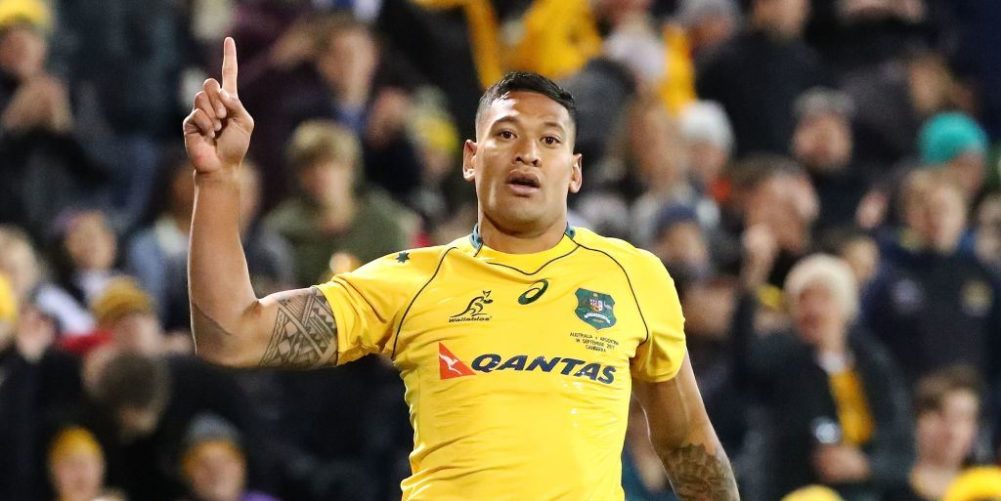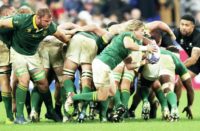Precious few players are described as “undroppable” a mere half an hour into their Test careers, but no one ever mistook Israel Folau for Joe Ordinary.
“We won't be ditching this guy in a hurry,” said an Australian scribe a few seconds after the Wallaby newcomer had put a spellbinding brace of tries past the Lions in Brisbane eight years ago. “It would be like leaving ‘Genesis' out of the Bible.”
Which was an interesting way of putting it, as things turned out. Folau has always had a closer relationship with the Good Book than with his own press cuttings – “As a Christian, I stand by the Bible and what the Bible says…every word that's written,” he said recently – and as a consequence, he has become the single most divisive figure in the recent history of the Union game.
It was primarily his fundamentalist take on sex and gender issues, expressed with a considerable degree of force on social media in 2019, that landed him in a sea of strife. Folau was removed from the Wallaby squad, his Rugby Australia contract was torn up, at least one major sponsor cut ties with him and he spent much of 2019 in the company of the legal profession before reaching a confidential settlement with his previous employers and switching codes – not to mention continents – by joining the Catalan Dragons in France.
That was that, we thought. But we thought wrong. All of sudden, Folau is back in the 15-man business with the Japanese Top League club NTT Communications Shining Arcs – not so much a name as an essay. (The old “give us a B…” joke about Borussia Monchengladbach is ancient history). And the story may not end in the land of the Brave Blossoms. Under the so-called “Giteau Law” governing the selection of exiled Aussies for the national team, Folau is, on the face of it, eligible for a return to the green and gold. The current minimum requirement for Wallaby reintegration is 60 caps. Folau had accumulated 73 by the time of his boots-and-all ruck with the governing body.
Could it be that Folau will be restored to the Wallaby back division in time for the World Cup in France a couple of years down the road? If he expresses a wish to be considered, would the rugby community in Australia welcome him? Just as importantly, how would the game at large react to his re-inclusion, given that his approach to “inclusivity” was at the heart of the row in the first place?
He will be 34 when the tournament comes around, which might be elderly for an international full-back possessed of earthly powers but is no great age for an attacking force of the stellar variety.
Whatever gifts Folau was able to draw upon back in 2013 – he stepped Johnny Sexton, handed off Alex Corbisiero and swept outside Leigh Halfpenny seemingly in the same moment in scoring that jaw-dropping second try against the Lions – are unlikely to be wholly exhausted. Class is permanent, as the saying has it, and the sport is not in so good a place that once-in-a-generation talents can be sacrificed without a care.
“Folau, with his 73 caps, is, on the face of it, eligible for a return to the green and gold”
But this Folau business – any temptation to call it the “Folau affair” must be resisted, owing to his stated views on adultery – runs far wider and deeper than a mere box-office calculation. It throws up obvious ethical questions and could easily turn political, especially as one of the player's most active and outspoken supporters is – you guessed it –a politician.
Clive Palmer, who made enough billions in mining to earn himself a place on the Forbes mega-rich list, has organised election campaigns at state level, formed his own party and served a term in the Australian parliament while pursuing an eye- wateringly successful business career. He is also the patron of Southport Tigers, an amateur Rugby League side on the Gold Coast, and his bid to secure Folau's services as a star attraction has generated some conflict.
On one side, the Australian Christian Lobby has thrown its weight behind Folau's rehabilitation, describing him as a “much loved champion” of sport in their country. On the other, many of the people who pay to watch rugby of both codes consider Folau to be a religious bigot and are in no hurry to support his reintegration.
It is perfectly possible that Folau will play for both the Southport Tigers and the Shining Arcs, thanks to the convenient scheduling of the Australian League and Japanese Union seasons. The man with pretty much nowhere to go could suddenly be everywhere at once, much to the delight of those who support his right to say what he likes, and offend as many people as he likes, through the offices of Instagram.
But there will surely come a point, especially if he makes a serious pitch for a World Cup recall, when his presence will divide a dressing room.
For every half-dozen teammates who don't much care about Folau's theological outpourings on digital platforms as long as he is running rings round opponents, and every one or two who view the world as he does, there will be another of relatively progressive persuasion who, rather than play alongside him, would rather not play at all. And then what happens?



























